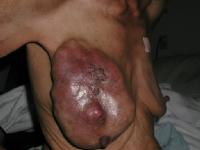Seven terrible myths about breast cancer
“Am I going to die from breast cancer within the next 10 years?” The question is tormenting many women these days. According to results of the latest opinion poll, 98% of women overestimate the threat of breast cancer. Below are some of the commonest myths about the disease.

Myth No 1: Breast cancer is the most lethal disease affecting women
Wrong. The mortality rate among women affected by cardiovascular diseases is 8 times greater. In actuality, breast cancer is the sixth biggest killer on list, next to pneumonia and flu.
AIDS and accidents kill more women under 45 than breast cancer does. However, breast cancer has become the most frightening disease to young women who fear losing their sex appeal after losing one of their breasts to cancer. Meanwhile, those women are likely to faint once they hear the word “mastectomy” (surgical removal of a breast) being mentioned yet they keep smoking; they ignore seat belts, and practice unsafe sex.
Myth No 2: breast cancer mortality rate is on the increase
Wrong. Breast cancer incidence rate has increased by comparison to the 1940s though its mortality rate stands at the same level. There is also a downward trend in the mortality rate. For example, the mortality rate dropped by 5% between 1988 and 1992. The above period saw the lowest level in mortality rate since 1950. But why the incidence rate went up while the mortality rate seems to be unchanged? The situation has to do with certain achievements in the methods of diagnosis and treatment. An increasingly larger number of women do mammography for the early detection of abnormal growths that can be successfully treated at that stage. Besides, modern methods of chemotherapy, radiotherapy and surgery helped curb the spread of tumor to the lungs, bones, and liver.
Myth No 3: my chances of developing breast cancer soon is one to eight
Wrong. A woman may develop breast cancer throughout her life. It is very important that a woman should be aware of this since many a women seem to expect being diagnosed with breast cancer every time they undergo examination.
Breast cancer is a disease that mostly occurs in much older women. A women has to reach 85 at the very least to see her chances of succumbing to breast cancer decrease to a one-to-nine ratio. Needless to say, many persons at such an age may die from a wide variety of different reasons and diseases.
Myth No 4: none of my relatives had breast cancer so I can relax
Wrong. The cause of breast cancer does not appear to have a familial link. So far the doctors have pointed out only age-related reasons behind the abnormal and uncontrolled division of cancer cells in the mammary glands.
BRCA1, a hereditary gene that is thought to be capable of increasing the risks of breast cancer, was detected only in 5-10% of women who developed the disease. This group of women has a higher risk of developing breast cancer at an earlier age (normally before reaching the menopause).
Eighty five percent of the women who inherit the gene run the risk of developing cancer while half of the number may have cancer before reaching 50. Besides, they run an increased risk of developing cancer of ovarian cancer.
Aside from the BRCA1 gene, another hereditary gene dubbed BRCA2 wasalso discovered.Accordingto specialists, the gene is responsible for causing cancer in another 35% of women.
Myth No 5: a genetically inherited predisposition for breast cancer is transmitted via maternal line only
Wrong. A genetically inherited predisposition can be inherited from both parents. Women may be completely unaware of a potential danger of inheriting the disease from a male parent because the presence of the genes BRCA1 and BRCA2 in men have no manifestations whatsoever. However, 50% of fathers with the above genes are capable of passing them down to their daughters. A daughter will run a higher risk of developing breast cancer after inheriting the genes from her father in case the latter had female relatives affected by the disease.
Myth No 6: I have a lot of risk factors so I may as well develop breast cancer
Wrong. The studies show that the majority of women with known risk factors are not subject to breast cancer. Moreover, no other risk factors but the age-related ones were found in many women with breast cancer. Some of the well-known risk factors are as follows:
- Relatives’ case history. A woman will run a higher risk of inheriting breast cancer if her female relatives (both her father’s and her mother’s) had cancer. The risks grow higher if her female relatives developed the disease before reaching menopause or in case the disease involved both breasts.
- Personal case history. The risks are higher if a woman had other breast diseases accompanied by the growth of normal breast cells or atypical hyperplasia i.e. an increase in the number of breast tissue elements due to its excessive production (benign tumor).
- Reproductive case history. The late menopause (occurring after 55) is believed to increase susceptibility to breast cancer. The risks are higher if a woman gives birth to her first child after 30 or she is childless. The above reproductive risks cause changes in the sex hormones, which affect the mammary glands.
- Use of alcoholic beverages. Dr. Walter Willet, a leading epidemiologist at Harvard University, believes that “a small amount of alcohol consumed by a woman on a daily basis can increase the risk of breast cancer. The more alcohol she drinks the greater risks she runs.” Numerous studies show that alcohol leads to a higher level of estrogens. There is a link between higher the increased production of estrogens and the development of a malignant tumor in the breast.
Myth No 7: nothing can be done if the doctors detect the genes BRCA1 and BRCA2 in my system
Wrong. Steps to reduce the risks can be taken even if a test reveals the presence of the above genes in the body of a woman. A monthly self-examination of your own mammary glands is one of the preventive measures. A woman is recommended to visit her gynecologist or oncologist every six months so that breast cancer may be detected at its earliest stage.
Double mastectomy (removal of both breasts) may be performed for preventions purposes yet most doctors are opposed to the method. A patient is likely to experience severe emotional trauma after the amputation. Besides, the amputation is not a 100% guarantee against the growth of cancer cells that may remain in the tissues.
Translated by Guerman Grachev
Pravda.ru
Subscribe to Pravda.Ru Telegram channel, Facebook, RSS!





